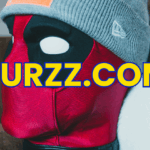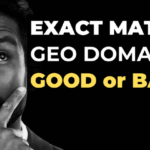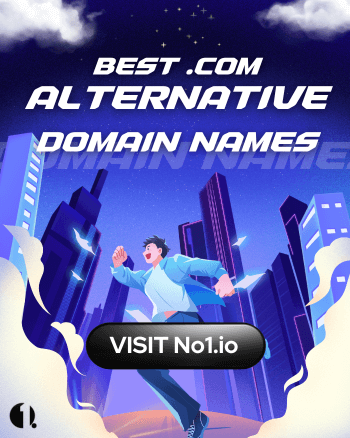What is Personal Branding & Why Does Your Domain Name Matter?
In today’s hyper-connected world, where first impressions happen online, personal branding is no longer optional—it’s essential.
Whether you’re a digital entrepreneur, business owner, consultant, or digital content creator, your name is your most valuable asset, and how you present it online can define your success.
In a world where trust is built online before it’s built in person, your personal brand needs a permanent home. And at the heart of a strong personal brand lies one critical digital asset—your domain name.
Your domain name that represent your personal brand is your most valuable asset—and how you present it online can define your success.
Your digital presence is your reputation—it’s the first thing potential clients, investors, and partners will check when deciding to work with you.
But here’s the challenge: How do you ensure that people see you the way you want to be seen? Let’s explore the best possible answer to this challenging question by going over to the details of Personal Branding and Domain Name.
Why is Personal Branding Important?
Personal branding isn’t just about having a sleek LinkedIn profile or a well-designed Instagram page. It’s about crafting a consistent, credible identity that sets you apart—and one that you own and control.
Why Should Every Brand Owner & Digital Entrepreneur Focus on Personal Branding?
It differentiates you from competitors – In crowded industries, people do business with brands they trust. A strong personal brand makes you the go-to expert in your field.
It builds trust & credibility – Would you trust a consultant with a Gmail address or one with a professional domain-based email ([email protected])? Owning your personal domain name enhances credibility instantly.
It attracts business opportunities & investors – Whether it’s clients, speaking engagements, or funding, people Google your name first. If they find a strong personal website, they take you more seriously.
It puts you in control of your online presence – If you rely on Social Media platforms in building your personal brand, your brand is at risk when these platform change its algorithm or rules.
Social media platforms like LinkedIn, Instagram, Twitter/X, and TikTok are excellent for visibility, networking, and engagement, but they come with a major risk because you don’t own them.
When you build your entire personal brand on social media, you’re renting space on a platform you don’t control. Algorithm changes, account suspensions, and platform shutdowns can wipe out years of hard work overnight.
Your website and domain name, however, are fully yours—a permanent, professional digital home that no one can take away. Social media should drive traffic to your website, not be the foundation of your brand.
Your domain = ownership & long-term security.
Social media = rented space with unpredictable changes.
When you own your domain name and website, your brand is secure, independent, and future-proof.
Takeaway: Social media is a powerful tool, but it’s not your home—your website is. Social media is great, but if your brand is your business, your website should be your headquarters—not just another profile on someone else’s platform.
The Role of a Domain Name in Personal Branding
Owning your personal domain name is the foundation of a strong personal branding strategy. A domain name is more than just a website address—it’s your digital calling card. Your domain name is your digital signature. It’s the first thing people search for, the first impression you make online, and often, the deciding factor in whether someone trusts you, hires you, or does business with you.
If you don’t secure your domain name, someone else will. And that means:
Lost opportunities—A potential client searches for your name, but they find someone else.
Brand confusion—A competitor, a random blogger, or even a scammer could use your name.
Reputation risk—Imagine someone using YourName.com for misleading or harmful content.
Your domain name is essential for Personal Branding. It is your digital identity, your credibility, and your brand’s future. A well-chosen domain name:
Boosts credibility – Having YourName.com or YourBrand.com gives you a professional, polished online presence.
Protects your name – Securing your domain prevents competitors or bad actors from taking it.
Improves discoverability – Owning a personal domain helps you rank better in Google searches, making it easier for people to find you. When someone looks up your name, your website should be the first result—not random social media profiles or unrelated links.
Provides full control – Unlike social media, where algorithms control who sees your content, a personal website is your owned digital space 100% yours. No risk of being banned, shadowbanned, or losing years of work due to a platform change.
Example:
Imagine building your personal brand on Instagram, Twitter or LinkedIn for years, only to have your account suspended or the platform change its rules. In contrast, your website ensures that your brand remains independent, accessible, and secure.
Takeaway: A domain name is your digital home. Own it, protect it, and build your personal brand on a foundation you control.
Personal Branding Examples & the Right Domain Name for Personal Branding Strategy
Your domain name is your digital identity, and choosing the right one is a strategic decision that can define your brand, increase trust, and improve discoverability.
Whether you’re an influencer, entrepreneur, consultant, or content creator, securing a brandable domain name ensures that your audience remembers, trusts, and finds you easily online.
Here are five key strategies for choosing the perfect personal branding domain name, along with real-world personal branding examples to illustrate how they work.
Use Your Full Name If Available
Your name is your most powerful brand asset. If it’s available, securing YourName.com should be your top priority.
Why?
It helps establish instant credibility—especially if you’re an entrepreneur, author, coach, or public figure.
It ensures that you—not someone else—control your online identity.
It ranks better in Google searches when people look for you.
Example:
GaryVaynerchuk.com → (Gary Vee, Entrepreneur & Speaker)
Pro Tip: If YourName.com is unavailable:
Add a keyword related to your field
Example:
GatesNotes.com → (Bill Gates, Entrepreneur, Microsoft)
Consider alternative extensions like .net or .me if they fit your brand (e.g., JohnSmith.me for personal branding).
Try a creative variation (e.g., JohnTheCoach.com for a personal development coach).
Why It Matters: If you don’t secure your name, someone else might—forcing you to buy it back later at a high price or lose control of your personal brand.
Keep It Short, Memorable & Brandable
A short, clean, and memorable domain name makes it easier for people to recall and type into a browser.
Why?
Short domains are easier to brand and promote on social media, business cards, and marketing materials.
Memorable domains are more likely to be revisited and shared.
A professional, simple name increases trust and credibility.
Example:
ChrisBrogan.com (Branding Expert & Speaker)
MarieForleo.com (Entrepreneur & Author)
Pro Tip:
Avoid long, complicated names that are hard to spell or remember.
If your full name is too long, use initials or abbreviations (e.g., JDSmith.com for John David Smith).
Test how easy it is to say your domain out loud—if it’s hard to pronounce, people might not remember it.
Why It Matters: A confusing or overly complex domain can make it difficult for people to find you, leading to lost opportunities.
Consider a Keyword-Based Domain for Industry Authority
If your exact name is unavailable, incorporating a relevant industry keyword can work to your advantage. This strategy reinforces your expertise and boosts SEO rankings by making your niche clear.
Why?
Helps Google and potential clients understand your expertise immediately.
Improves search visibility for industry-related terms.
Creates a strong brand identity within your field.
Example:
CollinsRealtors.com (For a realtor or real estate investor)
MarkAIConsulting.com (For an AI consultant)
LisaDesigns.com (For a graphic designer)
Pro Tip:
Choose industry-specific words that define your niche (e.g., Photography, Branding, Coaching, AI, Consulting).
Keep it short and brandable—avoid long, awkward keyword-stuffed names.
Ensure it aligns with your future growth—don’t limit yourself if you plan to expand beyond one niche.
Why It Matters: Using a keyword boosts your brand authority and makes it easier for potential clients to find you when searching for services in your field.
Avoid Numbers & Hyphens
Using numbers, special characters, or hyphens in your domain makes it harder to remember, type, and verbally communicate.
Why?
People naturally assume domain names don’t include numbers or hyphens.
It reduces the risk of misunderstandings when sharing your website verbally.
It makes your branding look cleaner and more professional.
Example:
John-Smith123.com → Difficult to remember and looks unprofessional.
JohnSmith.com → Clean, simple, and easy to type.
Pro Tip:
If your name includes a common number (like JohnSmith3rd), spell it out (JohnSmithThird.com).
If your name absolutely requires a hyphen, consider alternative branding strategies before committing.
Why It Matters: Numbers and hyphens lead to misspelled domains, lost traffic, and confusion, reducing your personal brand’s effectiveness.
Secure Social Media Handles Alongside Your Domain
Consistency is key in branding. After securing your domain, register matching social media handles to build a cohesive online presence.
Why?
Brand consistency across all platforms helps with trust and recognition.
Prevents imposters or competitors from using your name on social media.
Makes it easier for followers and potential clients to find you everywhere.
Example:
JaneCarter.com → Website
@JaneCarter → Instagram, LinkedIn, Twitter/X
Pro Tip:
Use the same username across all platforms whenever possible.
If your exact handle is taken, add a simple modifier (e.g., @JaneCarterOfficial or @TheJaneCarter).
Set up a social media presence even if you don’t plan to use every platform right away—it prevents others from claiming your name.
Why It Matters: A lack of brand consistency can cause confusion and make it harder for people to connect with you across different channels.
Personal Branding Statement & Your Domain Name
Your personal branding statement is the core message that defines who you are, what you do, and how you provide value to your audience. It’s your elevator pitch in a sentence—a statement that sets you apart and makes your expertise instantly clear.
But here’s the key: Your domain name should align with and reinforce your personal branding statement. When your name, expertise, and online presence are seamlessly connected, your brand becomes more memorable, credible, and authoritative.
What is a Personal Branding Statement?
A personal branding statement is a short, clear, and compelling summary of your professional identity. It should:
Define your expertise (What do you do?)
Highlight your target audience (Who do you serve?)
Showcase your unique value (Why should people trust you?)
Personal Branding Statement Examples & Matching Domain Names
“I help tech entrepreneurs build brands that stand out.“
Matching Domain Name: TechBrandingByJohn.com
“AI strategist helping businesses scale with machine learning.”
Matching Domain Name: MarkAIConsulting.com
“I coach creative professionals to turn passion into profit.”
Matching Domain Name: CreateWithLisa.com
“Digital marketing expert helping brands grow their online presence.”
Matching Domain Name: GrowthByAlex.com
Your Domain Name Should Reinforce Your Personal Branding Statement
When choosing a personal branding domain name, ask yourself:
Does it reflect what I do?
Does it align with my expertise and niche?
Is it short, brandable, and easy to remember?
Example:
A branding consultant named Emily Reed could choose:
EmilyReedBranding.com – Reinforces her branding expertise.
ReedConsulting.ai – Ideal if she works with AI-driven businesses.
Why This Matters:
- Your domain name should immediately tell people what you do.
- It should be consistent across your website, social media, and email.
- A well-chosen domain name builds instant credibility and authority in your industry.
Your personal branding statement is your message—but your domain name is how the world finds you.
Choose wisely, and own your digital identity before someone else does!
Your Domain Name is Your Most Valuable Personal Branding Asset
A strong personal brand starts with a strong domain name, and relying solely on social media is a risky strategy. Platforms change, algorithms shift, and accounts can be restricted or removed at any time. Owning YourName.com gives you full control over your online reputation, ensuring that your brand is always accessible, professional, and protected.
Your personal website should be a direct reflection of your expertise and personal branding statement, showcasing who you are, what you do, and why people should trust you. A well-chosen domain establishes credibility, enhances discoverability, and reinforces your authority in your industry.
The best time to secure your domain name is now—before someone else does. Waiting too long could mean losing your ideal domain to another individual or business, forcing you to settle for a less desirable alternative or pay a premium price to reclaim it.
What’s next?
Read “Brand Name vs. Business Name vs. Domain Name: Why Getting It Wrong Can Hurt Your Brand” for more insights about smart branding.
Ready to build your personal brand with the perfect domain name? Contact NamesDigest today for domain insights before securing the best domain for your brand!















